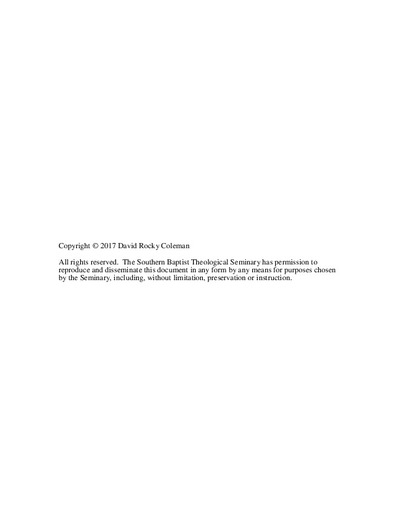An Examination of Richard Owen Roberts’s Theology of Revival
Subject
Religious awakening--United States--HistoryEvangelistic work--United States--History
Evangelists--United States
Roberts, Richard Owen, 1931-
Revivals--United States--History--20th century
Abstract
This dissertation examines Richard Owen Roberts’s (1931-) life and ministry to present his theology of revival. Chapter 1 examines the need for clarity in the topic of revival for the church today. It discusses my background in the topic area, and the process which guided the study. The chapter concludes with a discussion of the research questions explored during the research and writing process of this dissertation.
Chapter 2 contains a biography of the significant points of Roberts’s life and ministry. It presents some background of the time period in which he grew up, his early childhood, conversion, call to ministry, family life, preaching and bookstore ministries, and his legacy. A personal interview provides the content and support for the chapter.
Chapter 3 surveys Roberts’s published works and sermons to develop a complete theology of revival. In particular it examines his teachings on the following topics as the topic relates to revival: definitions, God, man, conversion, the church, the community, results, hindrances, and true revival. Through the study of these areas the reader is presented with a thorough examination of Roberts’s theology of revival.
Chapter 4 focuses on two significant connection points that Roberts has made in his ministry in revival—repentance and history. The chapter explores how and why Roberts has made these two connections. It examines his publications and teachings on the topics to demonstrate that from Roberts’s perspective one cannot have revival without repentance. Additionally, his ministry demonstrates that the church is best equipped for revival by examining the ways in which God has moved among his people in the past.
Chapter 5 demonstrates the need for Roberts’s theology of revival in the church today. It examines the shift that the church underwent in its understanding and practices of revival over the last century and a half, and it discusses how Roberts’s understanding of revival can bring helpful changes in this area. The chapter concludes with some critique of Roberts’s theology and practice of ministry.
Chapter 6 concludes the dissertation with final thoughts on Roberts’s theology of revival and its impact on the church. It also includes with several areas in which further study of Roberts and revival could be undertaken by other researchers.

